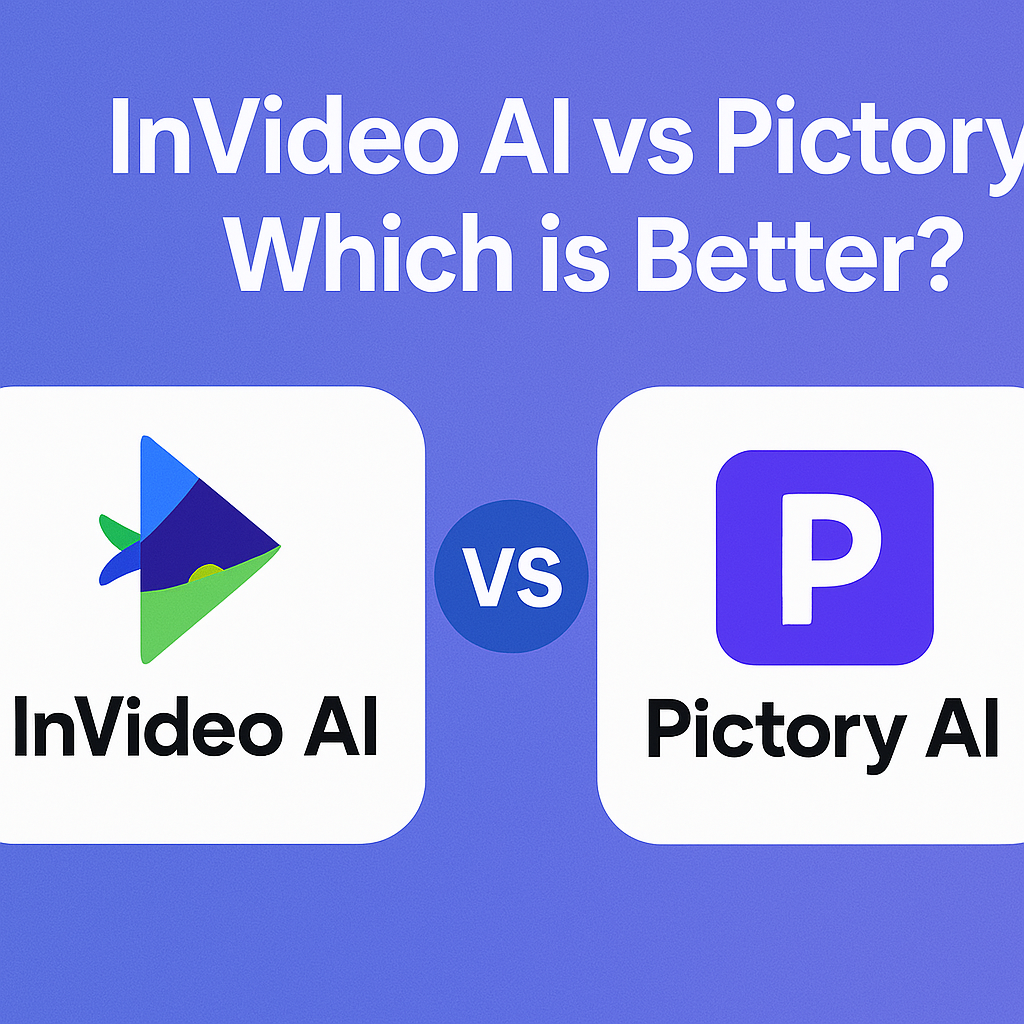Creating professional-quality videos doesn’t have to be complicated. Modern tools simplify the process, letting creators focus on storytelling. This guide breaks down two popular platforms designed to streamline video production, highlighting their strengths and unique offerings.
We’ll explore features like pricing tiers, template libraries, and editing capabilities. Free trials and customer support options will also be compared to help you make informed decisions. Whether you’re crafting social media clips or marketing campaigns, understanding these tools’ workflows is essential.
Data from recent user reviews shows that ease of use and feature depth vary between platforms. For example, one service offers thousands of customizable templates, while another prioritizes advanced editing tools. Real-world examples illustrate how these differences impact content creation speed and quality.
By the end of this article, you’ll know which platform aligns with your goals. Let’s dive into what makes each option stand out—and how to leverage their free trials to test-drive their capabilities firsthand.
Key Takeaways
- Free trials let you test features without financial commitment
- Template variety impacts creative flexibility
- Advanced editing tools save time for complex projects
- Pricing structures differ for casual users vs. teams
- Customer support quality affects troubleshooting speed
Introduction to AI Video Creation Tools
The digital era has revolutionized how we produce videos, making high-quality content accessible to everyone. Modern solutions now automate tasks like scene transitions and voiceovers, letting creators focus on storytelling. This shift is powered by platforms that combine vast stock libraries with smart editing features.
Overview of the AI Video Market
Recent data shows the video creation market growing rapidly. Tools today can turn blog posts into engaging clips or generate scripts from keywords. Many prioritize quality output, offering 4K resolution and professional-grade footage.
Here’s a snapshot of current capabilities:
| Feature | Benefit | Use Case |
|---|---|---|
| Text-to-Video | Saves hours of manual work | Social media ads |
| Auto-Captioning | Boosts accessibility | Training videos |
| Template Libraries | Speeds up production | Marketing campaigns |
Purpose of the Comparison
With so many options available, choosing the right platform matters. This analysis focuses on two leaders in the space—highlighting how their tools handle everything from stock media access to export settings. Our goal? pictory.ai To help you match features with your project’s scale and style.
Free trials play a key role here. Testing workflows firsthand reveals which service streamlines your video creation process best. Whether you need quick Instagram reels or detailed product demos, the right choice depends on your unique needs.
Exploring InVideo AI
Video makers seeking efficiency will appreciate streamlined workflows paired with professional results. One standout platform combines thousands of ready-to-use templates with smart assistance, making polished content achievable in minutes.
Where Templates Meet Technology
Over 5,000 customizable layouts cater to every project type—from YouTube intros to product demos. The drag-and-drop editor simplifies video editing, while an intelligent assistant suggests transitions and music. Users can create videos faster by repurposing text into storyboards or auto-generating captions. Before editing Shorts, check what they’re worth — here’s our take on YouTube Shorts monetization.
Paid plans unlock premium stock footage and remove watermarks. Here’s how the tiers stack up:
| Plan | Price/Month | Key Features |
|---|---|---|
| Free | $0 | Basic templates, 720p exports |
| Business | $30 | HD downloads, 100+ premium fonts |
| Unlimited | $60 | 4K resolution, priority support |
Flexible Options for Every Budget
The free tier lets newcomers test core tools without commitment. Upgrading removes limitations like track length and provides commercial licenses. Teams handling frequent projects benefit most from unlimited exports and collaborative workspaces.
Seasoned creators praise the platform’s balance between simplicity and depth. As one user noted: “I can prototype ideas in 20 minutes that previously took half a day.” Whether crafting quick social posts or detailed tutorials, these features adapt to diverse creation needs.
Diving into Pictory AI
Transforming lengthy articles into bite-sized videos has become a game-changer for marketers. This platform specializes in reshaping existing content—like blog posts or webinars—into polished clips perfect for social sharing. Its secret weapon? Smart algorithms that identify key moments and auto-generate visuals.
Main Capabilities and AI-Driven Tools
The tool analyzes text to suggest relevant stock footage and background scores. Users report converting 3,000-word articles into 60-second recaps in under 15 minutes. Key features include:
- Automatic highlight extraction from long videos
- Customizable captions with brand fonts
- Scene transition templates matching content tone
User Experience and Video Quality
First-time users praise the clutter-free dashboard. Drag-and-drop timelines and one-click caption edits make revisions simple. Export options support up to 1080p resolution, with 4K available in premium plans. Another editor comparison? Here’s our take on Veed.io vs Vidio based on speed and UI. Before editing Shorts, check what they’re worth — here’s our take on YouTube Shorts monetization.
“The preview render speed surprised me—no lag even with complex edits,” shares a freelance video editor. Three pricing tiers cater to different needs:
| Plan | Price/Month | Best For |
|---|---|---|
| Starter | $29 | Individual creators |
| Professional | $69 | Marketing teams |
| Enterprise | Custom | Large agencies |
A 7-day free trial lets teams test watermark-free exports. Whether you’re repurposing podcasts or crafting TikTok summaries, these options adapt to your workflow without overwhelming menus.
invideo ai vs pictory ai: A Side-by-Side Comparison
Choosing the right video creation platform depends on matching features to your creative workflow. Let’s examine how two leading tools stack up in critical areas—from starter templates to hands-off automation.
Template Libraries and Stock Media
One platform offers 5,000+ templates spanning social media formats and business presentations. Its library includes seasonal designs and trending layouts, with premium stock footage unlocked in higher-tier plans. The competitor focuses on repurposing existing content, providing fewer templates but smarter media matching based on your text input.
Editing Tools and Customization Options
The drag-and-drop editor in the first tool lets you tweak every visual element. Users can adjust transitions, layer text, and test color schemes without technical skills. The second platform simplifies the process through auto-synced captions and one-click style changes—ideal for quick revisions.
| Feature | Platform A | Platform B |
|---|---|---|
| Custom Fonts | 100+ options | Brand kit integration |
| Audio Editing | Multi-track mixing | Auto volume leveling |
Automated Processes and AI Script Generation
Both tools accelerate production through smart automation. One converts blog posts into storyboards in 2 minutes, while the other summarizes hour-long videos into highlight reels. “The AI script generator cut my prep time by 70%,” notes a content marketer. Consider which needs matter most—rapid first drafts or polished final cuts.
Evaluating Customer Support and Usability
Great video creation tools need more than features—they require reliable help when things go sideways. Let’s examine how two popular platforms handle user assistance and interface design.
Support Channels and Responsiveness
One service offers round-the-clock live chat support, ideal for urgent troubleshooting. Users report average response times under 5 minutes during peak hours. The competitor relies on email and chatbots, with replies often taking 12-24 hours.
| Platform | Support Channels | Average Response Time |
|---|---|---|
| Service A | 24/7 chat, email | 5 minutes (chat) |
| Service B | Email, chatbot | 18 hours |
Ease of Use for Beginners and Pros
Both platforms prioritize user experience through clean dashboards. Beginners appreciate guided tutorials for creating social media clips, while pros value keyboard shortcuts and batch editing. One user noted: “The timeline editor feels intuitive—I mastered basic edits in 20 minutes.”
AI-powered video features enhance workflows differently. Automated captioning and scene recommendations help newcomers, whereas advanced users leverage custom branding presets. These tools demonstrate how artificial intelligence adapts to various skill levels without overwhelming menus.
Selecting the Right Video Creation Tool for Your Needs
Picking the perfect video platform feels like finding the right pair of shoes—it needs to fit your stride. Let’s explore how budget, workflow needs, and tech compatibility shape your ideal match.
Key Decision Factors: Budget, Features, and Workflow
Start by assessing your monthly spend. A free plan works for testing basics, but teams needing unlimited exports often upgrade. Compare what matters most:
| Free Plan Feature | Platform X | Platform Y |
|---|---|---|
| Exports per Month | 5 | 3 |
| Watermark Removal | No | Yes (first 3 videos) |
| Media Library Access | 1,000+ assets | 500+ assets |
Freelancer Sarah R. shares: “Platform Y’s workflow saved me 10 hours/month through automated caption syncing.” Prioritize tools that align with your project frequency and style.
Integrations and Mobile App Capabilities
Check if your favorite apps connect. Some platforms sync with Canva for graphics or Slack for team updates. Mobile apps let you edit on-the-go—look for features like:
- Cloud storage access
- One-tap social media exports
- Offline editing modes
A robust media library with fresh stock footage keeps content vibrant. Always test customer support during free trials—24/7 chat beats 48-hour email delays for urgent deadlines.
Which is better for content creation: InVideo vs Pictory?
The InVideo vs Pictory comparison depends on your needs. InVideo offers more manual control with a vast library of templates, great for hands-on creators. On the other hand, Pictory or InVideo may be better suited for users who prefer automation—Pictory shines in turning long-form text or video into short, social-ready clips with minimal effort.
Conclusion
Finalizing your video toolkit requires balancing efficiency with creative control. Both platforms excel at helping creators streamline their creation process, though their approaches differ. One shines with vast template options for crafting engaging video clips, while the other automates text-to-video conversions for those needing to produce videos quickly.
Pricing models and support responsiveness remain key differentiators. Budget-conscious teams might prefer flexible monthly plans, while brands prioritizing polished outputs may invest in premium features. Free trials remain the smartest way to assess which interface aligns with your workflow.
For projects demanding high customization, our analysis suggests prioritizing template variety and editing depth. If repurposing existing content is your focus, lean toward tools offering intelligent media matching. Your ideal choice ultimately depends on whether speed or creative flexibility drives your creation process.
Ready to elevate your content? Test both platforms’ free tiers to discover which helps you craft videos quickly without compromising quality. Whether you’re building social media video clips that resonate or detailed tutorials, the right tool awaits—roll up your sleeves and start creating!

